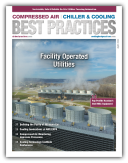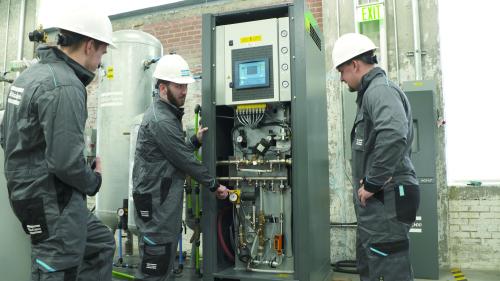
Training of sales engineers is a top priority for those who manufacture, sell and service compressed air systems. (Photo courtesy of Atlas Copco.)
Uptime. Profitability. Quality. Sustainability. Those goals are shared by leading manufacturers who have another thing in common: They use compressed air to achieve their goals, which is why those who make, sell and service compressed air systems say anything less than top-notch training of sales engineers is unthinkable considering how the sales team directly influences whether a compressed air system will fall woefully short, or deliver immeasurable value for years on end.
“Sales engineers are the ‘tip of the spear,’ of customer-facing personnel,” said Jim Donohue, Sales and Marketing Excellence Manager, Atlas Copco (www.atlascopco.com). “It is critical we develop people to represent our company well, but most importantly, to serve our customers effectively, efficiently and completely.”
Simply said, there’s a lot riding on the knowledge of a sales engineer for those who invest in compressed air systems to power their plants, said Frank Melch, Senior Sales Manager, Zorn Compressor & Equipment (www.zornair.com), based in Pewaukee, Wisconsin.
“End-users take the lead from salespeople, and it comes down to the competency of the sales representative involved,” said Melch. “That’s a big responsibility. A big responsibility. Sales reps have to understand what’s going on, how to size the solution correctly and apply controls correctly to make a successful installation.”
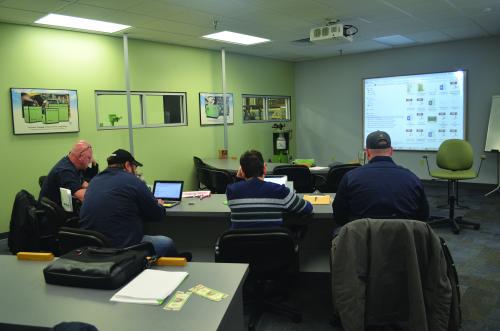
The success of a compressed air system is often driven by a comprehensive view of the application and the solution installed. (Photo courtesy of Sullair.)
A Customer-centric Approach
There was a time when air compressor manufacturers and local compressed air sales and service companies provided customers with solutions based upon product-centric information.
But that’s no longer a viable practice given today’s competitive manufacturing environment according to those who set out to establish long-term relationships with users of compressed air.
“Customers expect sales engineers to deliver value,” said Adam Bitner, Director of Sales, North America, at Sullair (www.sullair.com). “This can only be achieved if the sales engineer is properly equipped to provide clear, thoughtful solutions. Although product differentiators matter, the days of product-centric discussions have largely been replaced by more customer-centric discussions around efficiency, reliability, productivity and after sale support.”
Focusing on each operation’s application and specific goals in addition to a host of potential solutions as part of a comprehensive approach is crucial, echoes Ron Mazur, Atlanta Sales Manager for Blake & Pendleton (www.blakeandpendleton.com), based in Macon, Georgia.
“A lot of customers think it’s only about what happens in the compressor room and that’s not always the case. The best thing for any customer is for our people to understand how a system works as a whole,” Mazur said.
The overarching goal is to help decision-makers who purchase and manage compressed air systems get it right, said Jim Miller, President of CASCO USA, headquartered in Pittsburgh, Pennsylvania.
“Most manufacturers rely on the expertise of the equipment provider in the compressed air industry to recommend and install the right system,” Miller said, adding that CASCO USA (www.cascousa.com) takes an engineered-approach to sales. “Training and competency in compressed air is absolutely essential. While there are some customers who know compressed air, most have an entire plant to take care of and need outside expertise.”
Training and More Training
Creating and fostering compressed air expertise involves ongoing training and education, whether sales engineers are in the early, or later stages of their careers.
“There’s a difference between training and development,” said Melch of Zorn. “In general, training is the initial learning whereas development extends years into somebody’s career where we’re expanding knowledge and skill sets.”
Training programs involve a mix of classroom sessions, online programs, and daily on-the-job training opportunities, as well as nearly constant teaching and learning sessions during regular sales meetings that often involve problem-solving and role-playing. OEMs and local compressed air companies alike also take advantage of resources made readily available by the Compressed Air and Gas Institute (CAGI) and the Compressed Air Challenge.
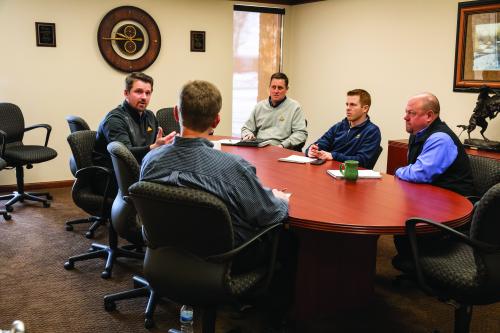
OEMs and local compressed air sales companies commonly turn regular sales meetings into teaching and learning opportunities. (Photo courtesy of Zorn Compressor & Equipment.)
Throughout the years, OEMs and local air compressor companies have developed extensive programs designed to address the steep learning curve in the compressed air industry, as well as the experience gap due to the aging workforce. An example is Atlas Copco’s Integrated Mentorship Program for Air Compressor Technologies (IMPACT), which readies sales representatives to assume field-based sales positions across the United States. The six-month program provides intensive, practical, hands-on training that gives participant’s the equivalent of one year’s work in the industry.
Donohue said the Atlas Copco program is based on a clear understanding on how to best train sales recruits.
“We know 10% of a person’s knowledge comes from classroom learning, 20% comes from learning from others and 70% comes from doing the actual task and we hold regular in-person training sessions to cover this,” Donohue said. “But we also know a person will learn more from being out in the field working with colleagues than they ever could in the classroom environment and our program gives them as much as the foundation they need to optimize their time in the field.”
Others, including Melch of Zorn, couldn’t agree more regarding the importance of field training. Zorn as with others make it a point to ensure new sales recruits shadow seasoned sales and service veterans on the job early and often.
“Everything is first understanding compressed air; the physics involved. Then it’s the technologies, then understanding all of the components of a system. Then we’ll go out and have them make sales calls,” Melch said. “We try to get them into compressor rooms pretty quickly. It’s like your best hitter in baseball hitting it off the tee every day. They need the reps.”
The length of training programs for local compressed air companies range from six months to one year or longer. Typically, programs will match the competency level of the trainee.
“There is no one answer to the extent of training,” said Mazur, noting that Blake & Pendleton doesn’t generally think of training as training. “We think of it more as a mentoring program. Based on the knowledge of the individual and their grasping of that knowledge, the program can be short, or it can be a number of years.”
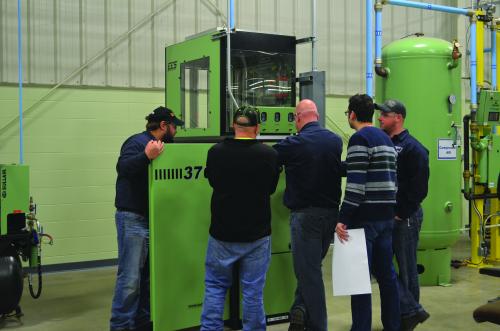
In-depth training continues to evolve as an ongoing and essential requirement for sales engineers in the compressed air industry. (Photo courtesy of Sullair.)
Aiming for Compressed Air Efficiency
Aside from soft skills and sales techniques, training programs concentrate on best practices, including compressed air efficiencies since most who sell compressed air systems recognize that electricity accounts for 76% of compressed air costs over a 10-year period. The remaining costs of a system includes the upfront purchase and installation costs and maintenance expenses.
“The industry has shifted over the past 30 years to focus on energy reduction and efficiency,” said Bitner of Sullair. “Broadly speaking, efficiency gains are widely available in most compressed air systems. Sales engineers are tasked to help customers identify these areas. For example, controls are a core training topic for new sales engineers.”
A thorough understanding of air compressor controls is nothing less than vital, said Melch.
“You have to understand part-load controls,” said, Melch who echoed thoughts of others by adding there are numerous aspects to efficiencies that require thorough training and knowledge gained through experience.
“It goes beyond understanding a VFD is most efficient at part load. You have to identify peak demand and then understand how to meet it, even if it only happens once a day. Let’s understand the load demand because that’s going to affect the control scheme. And operating costs are going to be determined by how the system meets different levels of demand.”
In addition to controls, sales representatives throughout the industry are trained to fully comprehend compressed air fundamentals including the relationship between power, pressure, and flow. Equally important is a working knowledge of data logging, information gathering, and analyses of the information as part of compressed air supply- and demand-side assessments. In many cases, sales engineers are taught to bring in specialists when an application calls for a detailed compressed air audit.
An example is Blake & Pendleton’s partnership with iZ Systems, which specializes in compressed air and vacuum energy audits. Typically, a Blake & Pendleton sales engineer will collect basic data and then bring in an iZ systems (www.izsystems.com) auditor for a deeper dive as needed, Mazur said. Newer sales recruits will often tag along during the auditing process.
“We’ll put those young guys with an auditor so they can spend a week understanding the full auditing process,” Mazur said. “We try to get our people to start in the compressor room, then work their way out, ask the right questions and then spend time with seasoned auditors.”
Gaining a Holistic View
Whether it’s orchestrated by an OEM or a local compressed air company, training programs stress the importance of a holistic view of a company’s compressed air needs and the solution needed. This includes training in compressed air quality, especially given its impact on air compressor uptime, production, and end-products.
“Air treatment training is critical since sales engineers need to apply the correct dryers, filter, etc. around the end product,” said Bitner. Training related to air quality at Sullair, and other companies includes an understanding of ISO air quality standards and classifications, as well as government regulations impacting various industries.
Bitner, as with others, notes how sales training related to air quality emphasizes the importance of thorough discussions with end users.
“When it comes to air quality, our sales engineers are encouraged to have the customer define that terminology very clearly because ‘clean, dry air’ means different things to different people,” he said.
Like others, Donohue said compressed air quality training is crucial given the importance of air quality on a plant’s operation.
“We focus heavily on air treatment using the ISO 8573-1 air quality standards as our guide,” he said. “Our sales engineers don’t leave the training room until they have a thorough understanding of air purity requirements, including particulate loading, pressure dewpoint and oil content, and which applications require more stringent air quality.”
Knowledge is Everything
For most OEMs and local compressed air companies, in-depth sales training is an ongoing and essential requirement given the complexities of compressed air systems, the critical role the systems play in virtually all manufacturing operations and the diversity of applications. Training is also something that continuously evolves.
“There are a lot of moving pieces when you’re training an individual,” Mazur said. “What we try to do is put together a platform that works best, but you need to be flexible in that platform in my eyes.”
Today, training of compressed air sales representatives, said Melch, is about much, much more than selling products.
“A more knowledgeable sales rep is a more confident the sales rep and that person is going to do a better job for the customer,” Melch said.
To read similar Compressed Air Technology articles, visit https://www.airbestpractices.com/technology.
Visit our Webinar Archives to listen to expert presentations on Air Compressor Technology at https://www.airbestpractices.com/magazine/webinars.


